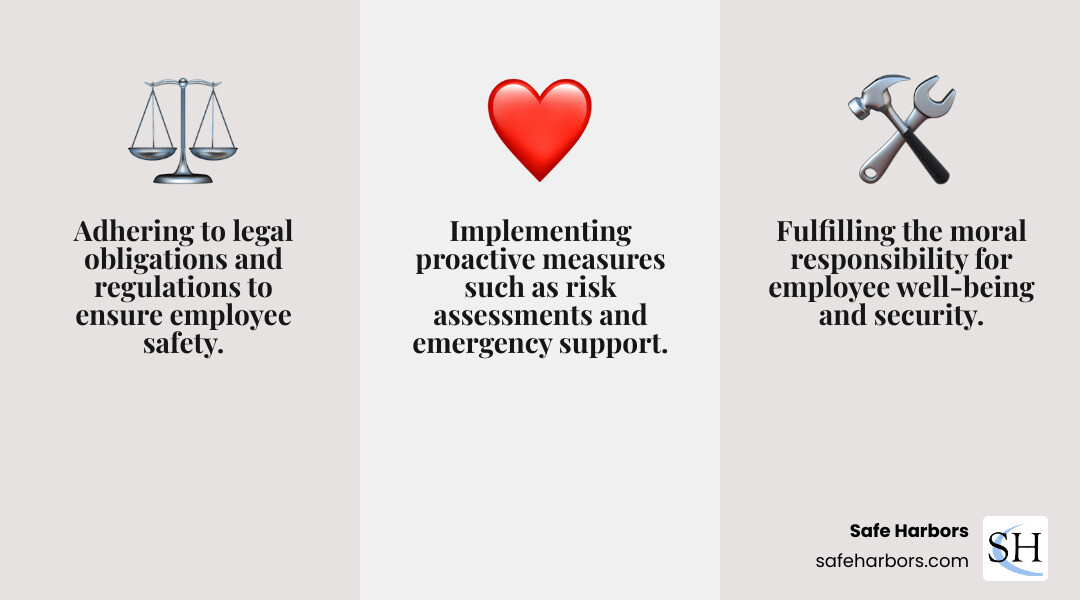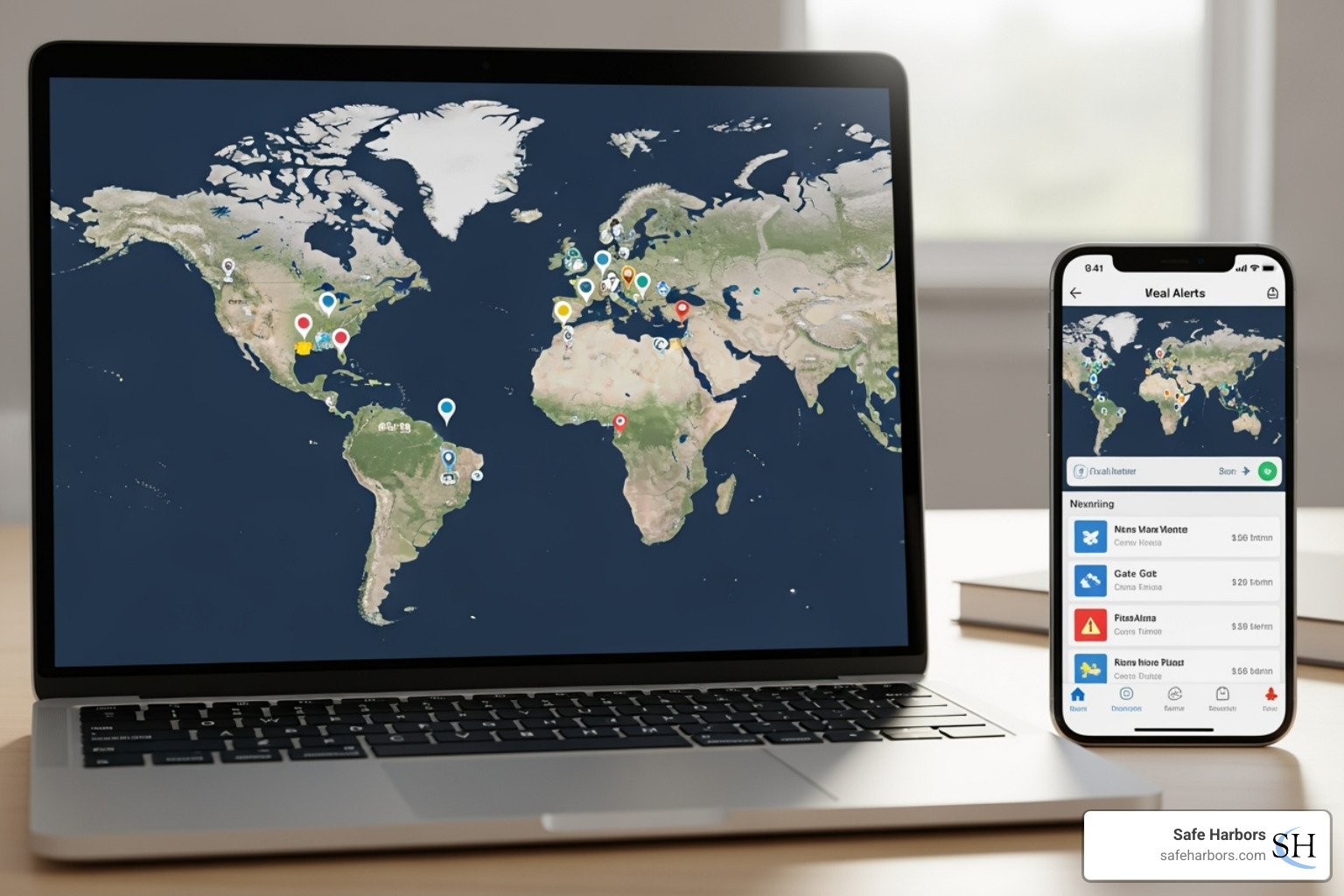Understanding Your Duty of Care Compliance Compass

Duty of care compliance is a critical concept for any business today. It's about a company's clear promise to keep its people safe. This isn't just a nice idea; it's a deep responsibility.
Here’s a quick look at what duty of care compliance means:
| Aspect | Description |
|---|---|
| What it is | A company's legal and ethical promise to keep employees safe from foreseeable harm. |
| Why it matters | Avoids lawsuits, keeps employees happy and productive, protects company name. |
| Key actions | Spot dangers, make clear rules, talk to employees, give support. |
As a corporate travel manager, you know that keeping your team safe is more complex than ever. People travel globally. They work remotely. Risks can pop up anywhere. This makes your role in duty of care compliance vital.
It’s also what your employees expect. A whopping 90% of workers believe their employers have a moral and legal duty to protect them. This guide will show you how to meet that trust. We’ll break down what duty of care compliance really means and how to put it into action.

Understanding Duty of Care: From Legal Obligation to Competitive Advantage
Let's talk about something truly important for any business today: duty of care compliance. It's not just a fancy term or another box to tick; it's the very foundation of a strong, ethical company. At Safe Harbors, we see it as the guiding principle for protecting your most valuable asset: your people.
The Legal and Ethical Foundations
At its core, duty of care compliance is a promise: as an organization, you're legally and ethically bound to protect your employees. This means taking every sensible step to prevent foreseeable harm, an idea known as "reasonable care."
This legal principle has deep roots, famously established in the 1932 case Donoghue v Stevenson. While the case involved a snail in a ginger beer bottle, it set the precedent that companies have a duty to care for those affected by their actions. This idea has since expanded to cover how employers must protect their teams, whether in the office or traveling globally.
Today, duty of care compliance is embedded in occupational health and safety laws, employment contracts, common law duties, and global regulations. These rules mandate that you act responsibly to avoid predictable harm to others, no matter where they work. Beyond the law, it's a moral promise to your employees who trust you to keep them safe.
The High Cost of Non-Compliance
The costs of ignoring duty of care compliance are huge, spanning legal, financial, and reputational damage. High-profile examples, like the $800 million settlement following the 2017 Las Vegas shooting, highlight the severe financial risks. These responsibilities also extend to the digital field, with data breaches leading to large payouts and mandated security overhauls.
The consequences go beyond direct fines and lawsuits. The ripple effects include:
- Legal Trouble: Lawsuits for negligence, personal injury, or breach of contract.
- Financial Drain: Significant regulatory fines and increased insurance premiums.
- Reputational Damage: Loss of trust from customers and partners, making it harder to attract top talent.
- High Employee Turnover: Employees are more likely to leave if they feel unsafe. Nearly half of workers (47%) say feeling cared for is a key reason to stay, almost as important as their salary.
In short, neglecting duty of care compliance can harm your reputation, increase staff turnover, and create significant legal exposure—a risk no responsible organization should take.
Benefits Beyond the Law
While avoiding legal trouble is a key driver, the perks of a strong duty of care compliance program go much further, giving your company a real competitive edge.
When employees feel safe and looked after, their trust and loyalty grow, which is crucial for retaining top talent. This reduces expensive recruitment costs and keeps valuable knowledge within your team.
A solid duty of care compliance plan also leads to:
- More productive teams: Secure and supported employees can focus on their work without worry, boosting engagement and productivity.
- A stronger reputation: Companies that genuinely care for their people are more attractive to future hires, partners, and clients.
- Better business continuity: Proactive risk management, a key part of duty of care compliance, ensures operations continue smoothly during unexpected events, protecting your bottom line.
A comprehensive approach to duty of care compliance isn't just a requirement; it's smart business. It builds a workplace where everyone feels valued, safe, and ready to do their best work. Want to dive deeper into how a comprehensive strategy can benefit your business? Explore the security advantages of robust corporate travel management.
Navigating Global Risks: Duty of Care for Business Travel
Our commitment to duty of care compliance doesn't stop at the office door. In today's interconnected world, business often takes our employees far from home. Whether it's for international assignments, remote work, or frequent business trips, our workforce is more mobile than ever. This presents unique challenges and truly amplifies our duty of care compliance responsibilities.
Applying Duty of Care to a Mobile Workforce
When our team members are out in the world, whether on international assignments, working remotely from different time zones, or traveling frequently, our duty of care compliance extends to their safety and well-being in these new environments. It means we need to anticipate and reduce risks that might not even exist within our familiar office settings.

Think about the complexities involved:
- International Assignments and Expatriates: Employees on long-term stays abroad face unique challenges. They might need to steer unfamiliar legal systems, healthcare setups, and even adapt to new cultures. Plus, personal safety can be a bigger concern in potentially high-risk regions.
- Remote Workers: Even seemingly safe home offices can bring up duty of care compliance considerations. Are they set up ergonomically? Are their cybersecurity measures strong enough? What's the emergency plan if they're far from the main office?
- Business Travelers: From the very first steps of pre-travel planning (which includes checking out risks for destinations) to making sure they have safe accommodation and reliable transportation, every part of a business trip falls under our duty of care compliance. We have to consider potential dangers like local crime rates, political instability, health concerns, and even the quality of local roads and services.
A one-size-fits-all approach simply won't work. For example, a CEO traveling to a well-known European city like Geneva faces completely different safety needs than an engineer deployed to a more unpredictable region like Libya. Similarly, travel risks in the Philippines in October (hello, typhoon season!) are wildly different from those in Russia in February (brrr!). Our duty of care compliance must be flexible enough to adapt to these ever-changing situations. That’s why a deep understanding of Business Travel Duty of Care and Risk Management is so incredibly important.
Tailoring Your Approach for Different Risks
There's no single perfect answer for duty of care compliance, especially when it comes to global travel. Our strategy needs to be as dynamic as the world our employees steer. This means fine-tuning our plans based on a variety of factors:
- Destination Risk Levels: We have to look closely at the specific risks for each place. This includes health concerns, the chance of natural disasters, crime rates, and political stability. High-risk destinations naturally need stronger rules, better security measures, and detailed emergency plans.
- Traveler Profiles: Who's traveling? A seasoned international executive might have different needs and be comfortable with different levels of risk than a new employee on their very first overseas trip. We also consider things like gender, nationality, and any specific medical conditions that might make someone more vulnerable.
- Employee Roles: The kind of work being done can also change the risk. An employee visiting a client in a safe city center has different requirements than someone working at a remote industrial site or in a conflict zone.
- Cultural Considerations: Understanding local customs, social norms, and what might be considered sensitive is super important for a traveler's safety and well-being. This includes giving cultural awareness training to help prevent misunderstandings or accidental offenses that could lead to dangerous situations.
- Solo Travelers: These individuals might face higher risks and need extra support, like more frequent check-ins and easy access to 24/7 assistance.
Tailoring our duty of care compliance means going beyond general guidelines. It involves truly understanding the "who" and "where" of each assignment. This makes sure every employee is equipped with the right knowledge, resources, and support for their unique journey.
Adapting to Evolving Global Threats
The global landscape is constantly changing, and our duty of care compliance framework must be nimble enough to respond to new threats, from pandemics to geopolitical shifts.
Recent years have highlighted several unpredictable risks:
- Pandemics: The COVID-19 crisis demonstrated the need for rapid adjustments to travel safety rules, quarantine protocols, and medical support.
- Geopolitical Instability: Sudden conflicts and civil unrest can make previously safe regions dangerous, requiring constant monitoring and evacuation readiness.
- Natural Disasters: Events like earthquakes, hurricanes, and wildfires pose direct threats and can severely disrupt travel, making robust emergency plans essential.
- Terrorism and Cyber Threats: These persistent risks demand a focus on both physical security and the protection of sensitive data while employees are abroad.
Despite these clear dangers, many organizations are underprepared. A PwC global crisis survey found that only 39% of U.S. businesses have a crisis plan they consider "very relevant." This highlights a critical gap in preparedness for today's threats.
At Safe Harbors, we understand that proactivity and adaptability are key. Our duty of care compliance strategies are designed to continuously assess evolving risks, ensuring your employees are informed, protected, and supported, no matter what happens.
A Practical Guide to Achieving Duty of Care Compliance
Achieving robust duty of care compliance isn't something that just happens; it's a proactive journey! It's all about building a strong framework. This framework helps integrate safety into every part of our operations, especially for our amazing mobile workforce.
Building Your Compliance Framework: Practical Steps
A solid duty of care compliance program stands on clear policies, smart preparation, and always getting better. Think of it as a recipe for peace of mind. Here’s how we bake it:
First, we always start with comprehensive risk assessments. Before anyone travels or begins an international assignment, we need to spot any potential bumps in the road. This means checking out the destination's political situation, health risks, crime rates, local transportation safety, and even cultural norms. Things can change fast, so we keep checking back.
Next, we develop clear policies and procedures. These are our safety playbooks! They spell out everything from safety rules and emergency plans to how we'll talk to each other and what employees need to do. We cover approved places to stay, safe ways to travel, health guidelines, and what to do in a crisis. These policies are our promise to keep everyone safe.
Then comes thorough employee training. We want our team to feel ready for anything. Training helps them understand travel safety, cultural differences, emergency steps, and how to use any safety tools we provide. This way, our employees are empowered to be active partners in their own safety.
It's also vital to create a robust crisis management plan. Even with the best plans, unexpected things can happen. Our crisis plan clearly outlines who does what, how we'll communicate, and how we'll respond to different situations like medical emergencies, security issues, or natural disasters. We practice these plans often, just like fire drills!
Finally, we establish consistent communication protocols. Keeping the lines open is super important, whether it's before, during, or after a trip. This means sending out pre-trip advice, real-time alerts if something changes, and regular check-ins with our travelers.
By following these practical steps, we can significantly boost our duty of care compliance. This helps ensure our employees are as safe as possible, no matter where their work takes them. For an even deeper dive into setting up these vital measures, be sure to explore our guide on Why Implementing a Travel Risk Plan for Employees is Crucial.
The Role of Technology in Modern Duty of Care Compliance
In today's world, technology isn't just helpful; it's essential for achieving top-notch duty of care compliance. It gives us the power to manage risks more smartly, talk more clearly, and react much faster when things go sideways.

At Safe Harbors, we use cutting-edge technology to give you best support:
Our advanced systems allow for precise traveler tracking. We know where our employees are at all times, which means we can quickly locate them if an emergency strikes. This is especially key when different booking methods might scatter travel details.
We also provide real-time alerts. Our systems send immediate notifications about developing situations. Think severe weather, political unrest, or security threats – these go straight to our travelers and management teams.
Our user-friendly mobile apps put critical information right in our employees' hands. They can access travel plans, emergency contacts, safety rules, and even check-in from their phone.
With integrated communication platforms, we can have two-way conversations during a crisis. This lets us send out mass messages and get confirmation that everyone is safe.
Plus, tools that connect travel booking with expense management integration give us a full picture of employee movements. This really helps with tracking and staying compliant.
Beyond general travel management, new tech is popping up to tackle specific threats. For example, visual AI weapons detection systems are gaining traction to prevent workplace violence. These smart systems, like Omnilert Gun Detect, can spot threats even before a problem starts. While mainly for fixed locations, this idea of smart, proactive threat detection helps boost overall safety.
Our commitment to Immediate Response is truly powered by these amazing tech advances. They ensure that if an incident happens, we can act quickly and decisively to protect our team.
Shared Responsibility: The Role of Leadership and Departments
Effective duty of care compliance isn't a one-person show; it's a team effort! It needs everyone's support and cooperation across the whole company.
It starts with leadership buy-in. Our senior leaders set the example, showing everyone that employee safety and well-being are top priorities, not just rules we have to follow.
The HR department plays a huge part in creating and sharing policies. They also handle training, employee assistance programs, and support mental health. Often, they're the first stop for employees with concerns.
Our security teams are the experts. They assess risks, watch global threats, create security plans, and lead our crisis responses. They bring the know-how to handle both physical and digital dangers.
Travel managers are on the front lines of duty of care compliance for business trips. They make sure bookings follow safety rules, track travelers, and work with outside help when needed.
Our legal and compliance teams make sure all our duty of care compliance policies follow local and international laws. This helps us avoid legal headaches.
And finally, employee accountability is key. While the company is primarily responsible, employees also have a role to play. They should follow safety rules, complete training, report any issues, and generally look out for their own safety.
By building this culture of shared responsibility, we make sure duty of care compliance is deeply woven into the fabric of our organization. This creates a safer, more supportive place for everyone.
Frequently Asked Questions about Duty of Care
We get it – duty of care compliance can feel overwhelming at times. Between the legal jargon, evolving global risks, and practical implementation challenges, it's natural to have questions. We've been helping companies steer these waters for years, and here are the questions that come up most often in our conversations.
What is the difference between duty of care and standard of care?
This is one of those legal distinctions that actually matters in the real world. Think of it this way: duty of care is like having a driver's license – it establishes that you have a responsibility to drive safely. Standard of care is more like the specific traffic rules you need to follow to be considered a safe driver.
Duty of care creates the fundamental obligation. As an employer, you have a legal responsibility to protect your employees from foreseeable harm. It's the basic promise that says, "We will take reasonable steps to keep you safe."
Standard of care gets into the nitty-gritty details. It's the specific level of caution and prudence that a reasonable employer would exercise in similar circumstances. For business travel, this might mean providing pre-trip safety briefings, ensuring accommodations meet safety standards, or having 24/7 emergency support available.
Here's where it gets practical: if something goes wrong, courts don't just ask whether you had good intentions. They look at whether your actions met the standard that other reasonable employers would follow. Did you provide the training, resources, and support that any prudent company would offer? That's your duty of care compliance benchmark.
Does duty of care apply to an employee's personal time during a business trip?
The short answer? Yes, and it's more straightforward than you might think.
When you send an employee on a business trip, you've essentially placed them in a new environment – often far from their usual support systems. Even when they're exploring the local sights or grabbing dinner on their own time, they're still there because of work. This connection means your duty of care compliance responsibilities continue around the clock.
Think about it practically. If your employee gets hurt while sightseeing in Bangkok on a Saturday, they're still going to need the same emergency medical assistance, evacuation support, or crisis communication that they'd need during a Tuesday morning client meeting. They can't just pop home to their regular doctor or rely on their usual local contacts.
This doesn't mean you need to micromanage every moment of their trip. But it does mean ensuring they have access to emergency support, health assistance, and security resources for the entire duration of their travel. Many companies find that clear communication about this coverage actually helps employees feel more comfortable and confident during their trips.
How can we ensure our duty of care compliance program is effective?
Building an effective duty of care compliance program isn't a "set it and forget it" situation. It requires ongoing attention and regular fine-tuning, much like maintaining any other critical business system.
Regular policy reviews are essential because the world keeps changing. What worked for business travel in 2019 needed major updates by 2020, and it continues evolving today. We recommend reviewing your policies at least annually, or whenever major global events occur.
Practice makes perfect when it comes to emergency response. Conducting regular drills and tabletop exercises helps identify gaps in your plans before they become real problems. These don't need to be elaborate productions – even simple "what if" discussions with your team can reveal important insights.
Listen to your travelers – they're your best source of real-world feedback. The employee who just returned from a challenging assignment often has valuable insights about what worked well and what didn't. Create easy ways for them to share their experiences and suggestions.
Stay informed about global developments. This means monitoring not just obvious risks like political instability, but also health advisories, natural disaster patterns, and emerging security threats. The key is having systems that help you spot relevant changes quickly.
Consider expert partnership as a practical solution. Many companies find that partnering with a specialized travel risk management provider significantly improves their capabilities. These partnerships can provide the expertise, technology, and 24/7 support that's challenging to maintain in-house, ensuring your duty of care compliance program is both comprehensive and responsive to your employees' needs.
The most effective programs are those that evolve continuously, learning from each experience and adapting to new challenges. It's about creating a safety net that's strong, flexible, and always ready to support your team wherever business takes them.
Conclusion: Partnering for Peace of Mind in Global Travel
So, where does all this leave us? Upholding your duty of care compliance isn't just about ticking boxes or avoiding legal headaches. It's a deep commitment – a legal necessity, an ethical imperative, and a genuinely powerful strategic advantage for your business. When you invest in your people's safety, you're investing in trust, loyalty, and a stronger, more resilient organization.
The world of global business travel is always changing, bringing new opportunities and new challenges. Trying to steer these complexities alone can feel overwhelming. That's why a proactive approach, supported by an expert partnership, is truly the key to protecting your most valuable asset – your people. It’s about ensuring they have the peace of mind to focus on their work, knowing you have their back.
At Safe Harbors, we understand these critical responsibilities. We pride ourselves on providing that "white-glove service" and rapid response, ensuring your team is safe, supported, and secure, no matter where business takes them. We're here to help you turn complex duty of care compliance into a seamless, reassuring experience.
Ready to explore how a truly secure and supportive travel program can benefit your team? We invite you to learn more about our comprehensive Business Travel Services. Let's partner to keep your people safe and your business thriving.




